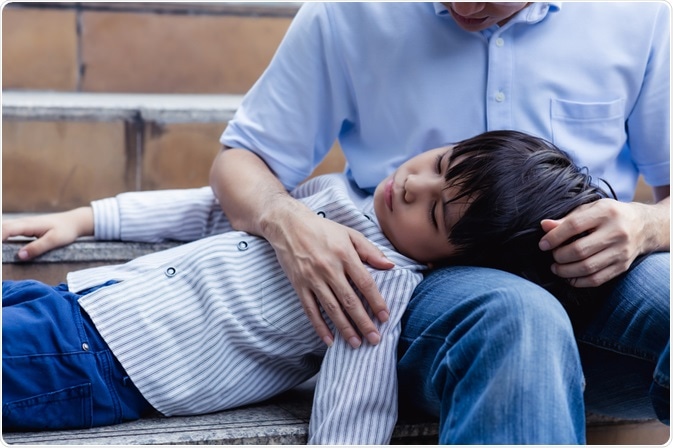Rotavirus is the leading cause of gastroenteritis in children and is considered to be the most common cause of severe diarrhea in children under the age of 5 worldwide. Infection with this virus represents a major burden for the healthcare system and society, but it also has a substantial psychosocial impact on the families of affected children.

Image Credit: Nutlegal Photographer / Shutterstock.com
Improved personal hygiene and community sanitation measures throughout much of the developed world have significantly reduced the prevalence of bacterial and parasitic diseases. On the other hand, these measures have shown negligible effects on the spread of rotavirus and its potential complications, which include severe dehydration, hospitalization, and, in certain instances, death.
Although gastroenteritis caused by rotavirus is regarded as a self-limiting disease, a dangerous combination of vomiting, watery diarrhea, and fever often leads to rapid dehydration. Therefore, the prevention of dehydration represents a key step in treating rotaviral gastroenteritis in children.
Oral rehydration therapy
A continuation of the usual diet and adequate fluid intake is recommended for children with minimal or no dehydration at all. Different studies have established that a child’s regular diet reduces the duration of diarrhea. Breastfeeding should be continued in infants who are breastfed. For infants who are formula-fed, it is not recommended to dilute the formula.
Prompt oral rehydration therapy using an oral rehydration solution before the child becomes more severely dehydrated is pivotal. Oral rehydration therapy, which contains water and small amounts of salt and sugar as recommended by the World Health Organization (WHO), is given as the first line of treatment with more than 90% of effectiveness.
Liquids such as plain water, sodas, apple juice, or chicken broth do not represent viable alternatives to oral rehydration therapy due to their hyperosmolarity and inability to adequately replace sodium, potassium, and bicarbonate. In addition, these fluids, particularly water and apple juice, can result in hyponatremia.
Ondansetron, which is a 5-hydroxytryptamine-3 serotonin antagonist, can be given as an emergency if vomiting is hampering oral rehydration therapy. Infants who appear significantly dehydrated should ideally have 20 ml/kg isotonic sodium chloride or Ringer lactate solution administered on the way to the hospital.
The administration of intravenous fluids requires at least six hours in the emergency department or an overnight stay in the hospital. Depending on the severity of dehydration, two intravenous lines or an intraosseous line can be introduced. Rehydration with intravenous fluids will correct the sodium and water deficit, as well as the ongoing fluid deficit.
Probiotics and other drugs
Probiotics have shown certain benefits in modulating the immune response against foreign antigens in children with rotaviral gastroenteritis, but also other types of diarrheal illnesses. Well-controlled clinical trials have shown that probiotics such as Lactobacillus rhamnosus GG, Lactobacillus casei, Lactobacillus reuteri, and Saccharomyces boulardii can be used for that purpose.
Nitazoxanide, which is a nitrothiazole benzamide compound notable for its activity in treating intestinal protozoal and helminthic infections, has also shown promise in treating severe cases of rotaviral gastroenteritis. Although immunoglobulin preparations have been assessed in pediatric patients, there are still no clear guidelines for their use in diarrhea caused by rotaviruses.
Antidiarrheal medications should not be given to children with acute rotaviral gastroenteritis since they can delay the elimination of the virus from the intestines. Racecadotril (acetorphan), an antisecretory drug that inhibits intestinal enkephalinase without slowing intestinal transit, has shown efficacy in reducing stool output and duration of diarrhea in rotavirus infections.
References
Further Reading
Last Updated: Dec 9, 2022